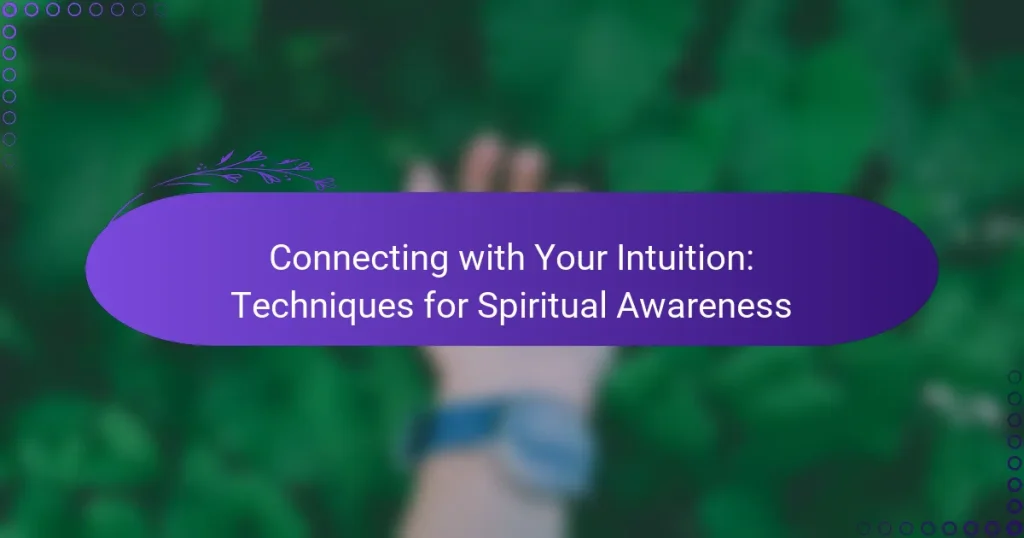Connecting with your intuition is essential for enhancing self-awareness and making aligned decisions in daily life. By practicing mindfulness and reflective techniques, you can cultivate a deeper connection with your inner self and tap into your spiritual potential. These methods not only foster intuition but also guide you toward choices that resonate with your values and instincts.
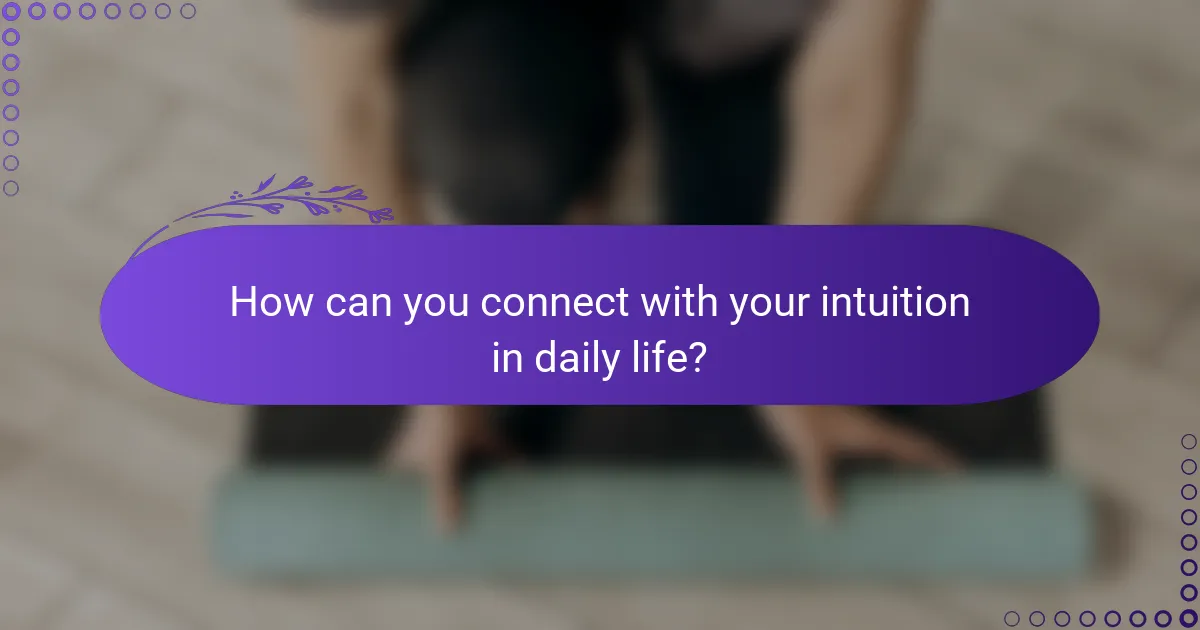
How can you connect with your intuition in daily life?
Connecting with your intuition in daily life involves practicing techniques that enhance your self-awareness and inner guidance. By incorporating mindfulness and reflective practices, you can better tune into your intuitive insights and make more aligned decisions.
Mindfulness meditation
Mindfulness meditation is a powerful technique for connecting with your intuition. It involves focusing your attention on the present moment, which helps quiet the mind and allows intuitive thoughts to surface. Start with just a few minutes each day, gradually increasing the duration as you become more comfortable.
To practice, find a quiet space, sit comfortably, and focus on your breath. When your mind wanders, gently bring your attention back to your breathing. This practice can help you develop a deeper awareness of your thoughts and feelings, making it easier to recognize intuitive nudges.
Journaling for self-reflection
Journaling is an effective way to connect with your intuition through self-reflection. By writing down your thoughts, feelings, and experiences, you can uncover patterns and insights that may not be immediately apparent. Aim to journal regularly, whether daily or a few times a week.
Consider prompts like “What do I truly want?” or “What feels right for me?” to guide your writing. This process can help clarify your thoughts and feelings, allowing your intuition to emerge more clearly.
Nature walks for clarity
Taking walks in nature can significantly enhance your intuitive connection. The natural environment provides a calming backdrop that encourages introspection and clarity. Aim for at least 30 minutes of walking in a park or natural setting a few times a week.
During your walk, focus on your surroundings and allow your mind to wander. This combination of physical activity and exposure to nature can help you tune into your inner voice and gain insights that may be clouded by daily distractions.
Breathwork techniques
Breathwork techniques can help you connect with your intuition by regulating your body’s stress response and promoting relaxation. Simple practices like deep belly breathing or alternate nostril breathing can be effective. Spend a few minutes each day practicing these techniques to enhance your awareness.
For deep belly breathing, inhale deeply through your nose, allowing your abdomen to expand, then exhale slowly through your mouth. This practice can calm your mind and create space for intuitive thoughts to arise.
Creative expression through art
Engaging in creative expression through art can unlock your intuitive insights. Activities like painting, drawing, or crafting allow you to tap into your subconscious and explore your feelings without judgment. Set aside time each week to create, regardless of your skill level.
Focus on the process rather than the outcome; let your intuition guide your choices of colors, shapes, and materials. This freedom can lead to unexpected discoveries about yourself and enhance your connection to your inner guidance.
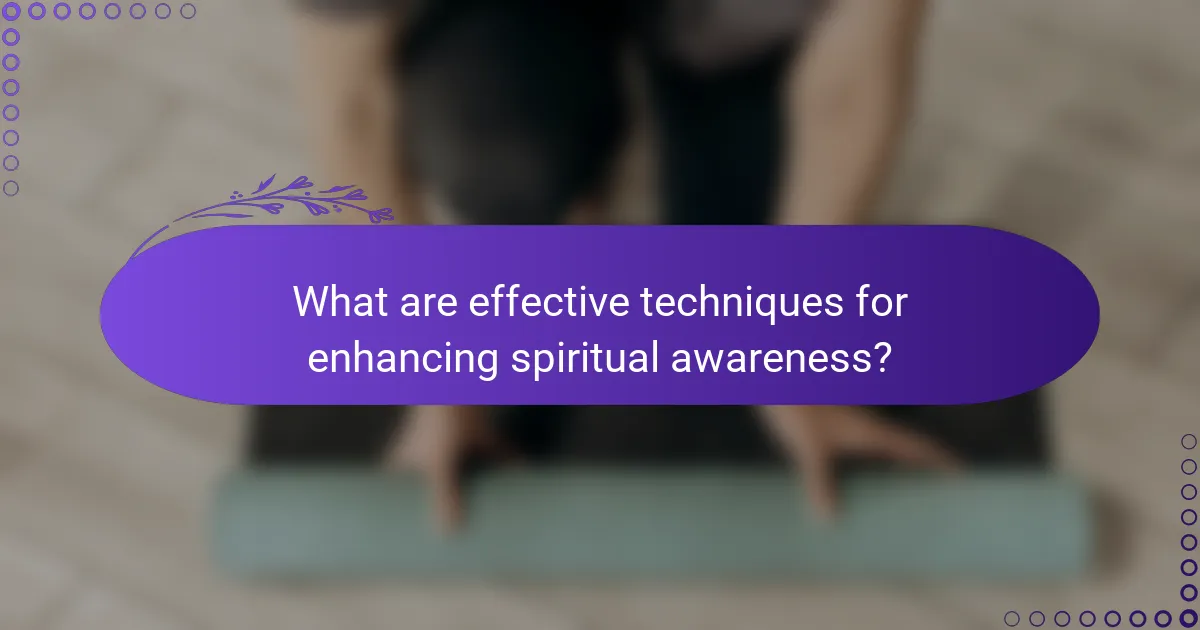
What are effective techniques for enhancing spiritual awareness?
Effective techniques for enhancing spiritual awareness include practices that foster a deeper connection with your intuition and inner self. These methods can help you tap into your spiritual potential and cultivate mindfulness.
Guided visualization practices
Guided visualization involves using mental imagery to achieve a specific state of consciousness or to connect with your spiritual self. This technique often includes listening to a facilitator who leads you through a series of visual scenarios designed to evoke feelings of peace and insight.
To practice guided visualization, find a quiet space, close your eyes, and focus on your breath. You can use recordings or apps that provide guided sessions, typically lasting between 10 to 30 minutes. Aim to visualize calming scenes or positive affirmations that resonate with your spiritual goals.
Energy healing methods
Energy healing methods, such as Reiki or Qigong, focus on balancing the body’s energy fields to promote healing and spiritual awareness. These practices often involve the transfer of energy from the practitioner to the recipient, helping to clear blockages and enhance overall well-being.
To explore energy healing, consider attending a local workshop or finding a certified practitioner. Sessions may vary in length from 30 minutes to over an hour, and many people report feeling relaxed and more connected to their intuition afterward.
Chakra balancing exercises
Chakra balancing exercises aim to align and harmonize the body’s seven energy centers, which can enhance spiritual awareness. Techniques may include meditation, yoga, or specific breathing exercises that target each chakra.
To practice chakra balancing, you might start with a simple meditation focused on each energy center, spending a few minutes visualizing its associated color and qualities. Incorporating yoga poses that correspond to each chakra can also be beneficial, with sessions typically lasting around 20 to 60 minutes.
Intuitive tarot reading
Intuitive tarot reading uses a deck of tarot cards to gain insights into personal situations and spiritual questions. This practice encourages you to tap into your intuition and interpret the cards based on your feelings and experiences.
To begin intuitive tarot reading, select a deck that resonates with you and familiarize yourself with the meanings of the cards. Start with simple spreads, like a three-card layout, and allow your intuition to guide your interpretations. Regular practice can deepen your connection to your inner voice and enhance your spiritual awareness.
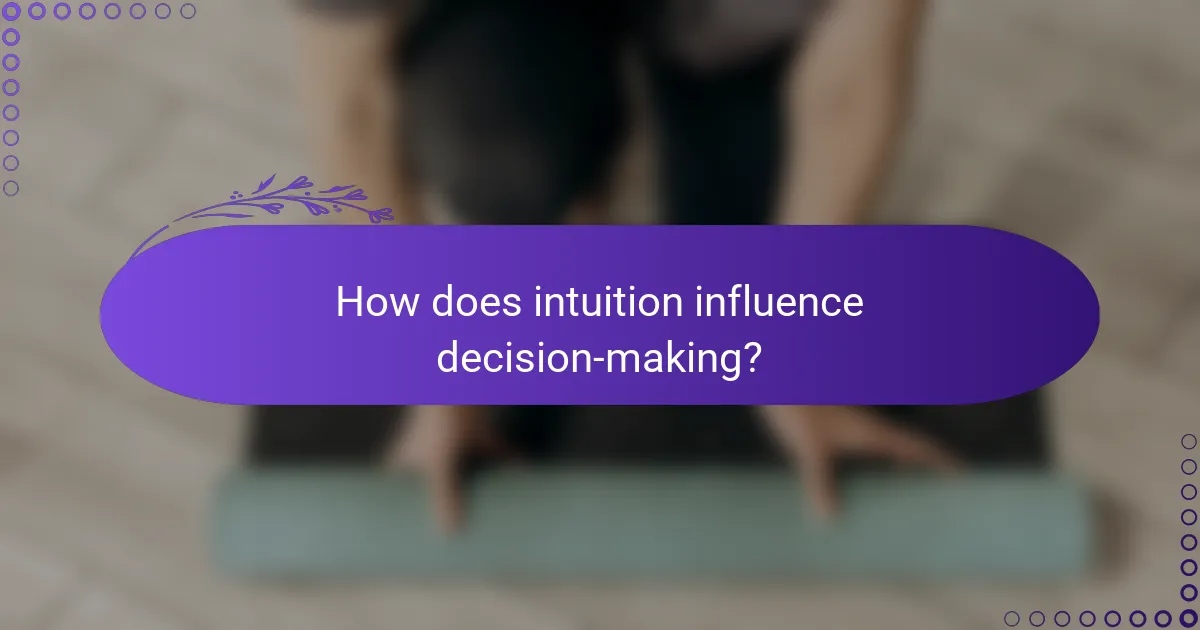
How does intuition influence decision-making?
Intuition plays a significant role in decision-making by providing quick insights based on past experiences and subconscious knowledge. It often guides individuals toward choices that align with their values and instincts, especially in uncertain situations.
Trusting gut feelings
Trusting gut feelings involves listening to your internal signals when faced with choices. These feelings often arise from accumulated experiences and can serve as a reliable guide. For instance, if you feel uneasy about a business deal, it may be wise to reconsider, as your intuition might be alerting you to potential risks.
To strengthen this trust, practice mindfulness and self-reflection. Regularly check in with your feelings during decision-making processes to better understand the messages your intuition sends.
Recognizing intuitive signs
Intuitive signs can manifest in various forms, such as dreams, sudden insights, or physical sensations. Being aware of these signs requires tuning into your emotions and thoughts, as they often provide clues about the right path to take. For example, a recurring dream about a specific location might indicate a need to explore that place further.
To enhance your ability to recognize these signs, keep a journal to document your feelings and experiences. Over time, patterns may emerge that can help you identify your unique intuitive signals.
Balancing logic and intuition
Balancing logic and intuition is crucial for effective decision-making. While intuition offers quick insights, logical reasoning provides a structured approach to evaluate options. Striking this balance can lead to more informed choices, especially in complex situations.
To achieve this balance, consider using a simple framework: list the pros and cons of each option while also reflecting on your gut feelings. This method allows you to incorporate both analytical thinking and intuitive insights, leading to well-rounded decisions.
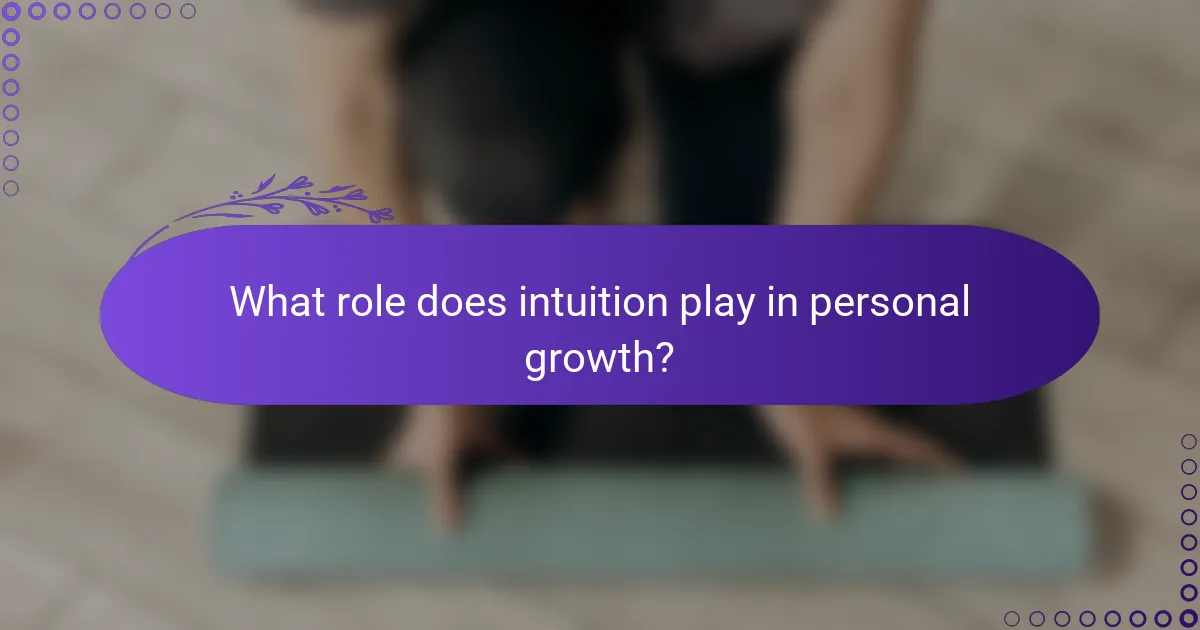
What role does intuition play in personal growth?
Intuition serves as a guiding force in personal growth, helping individuals make decisions aligned with their true selves. By tapping into intuitive insights, one can navigate challenges, enhance self-awareness, and foster meaningful connections.
Facilitating self-discovery
Intuition plays a crucial role in self-discovery by encouraging individuals to listen to their inner voice. This process often involves reflecting on feelings and thoughts that arise in different situations, which can reveal hidden desires and values.
Engaging in practices like journaling or meditation can enhance this connection to intuition. Regularly setting aside time for introspection allows for deeper understanding and clarity about personal goals and aspirations.
Enhancing emotional intelligence
Emotional intelligence is significantly influenced by intuition, as it helps individuals recognize and understand their own emotions and those of others. By trusting intuitive feelings, one can respond more effectively in social situations and improve interpersonal relationships.
To enhance emotional intelligence through intuition, consider actively observing your emotional responses in various contexts. This practice can lead to better empathy and communication skills, essential for personal and professional growth.
Building resilience through intuition
Building resilience is easier when one learns to trust their intuition during challenging times. Intuitive insights can guide individuals in making decisions that align with their values, helping them navigate adversity more effectively.
To cultivate resilience, practice tuning into your gut feelings when faced with difficult choices. This can involve asking yourself what feels right in a situation, which can lead to more confident and authentic decision-making.
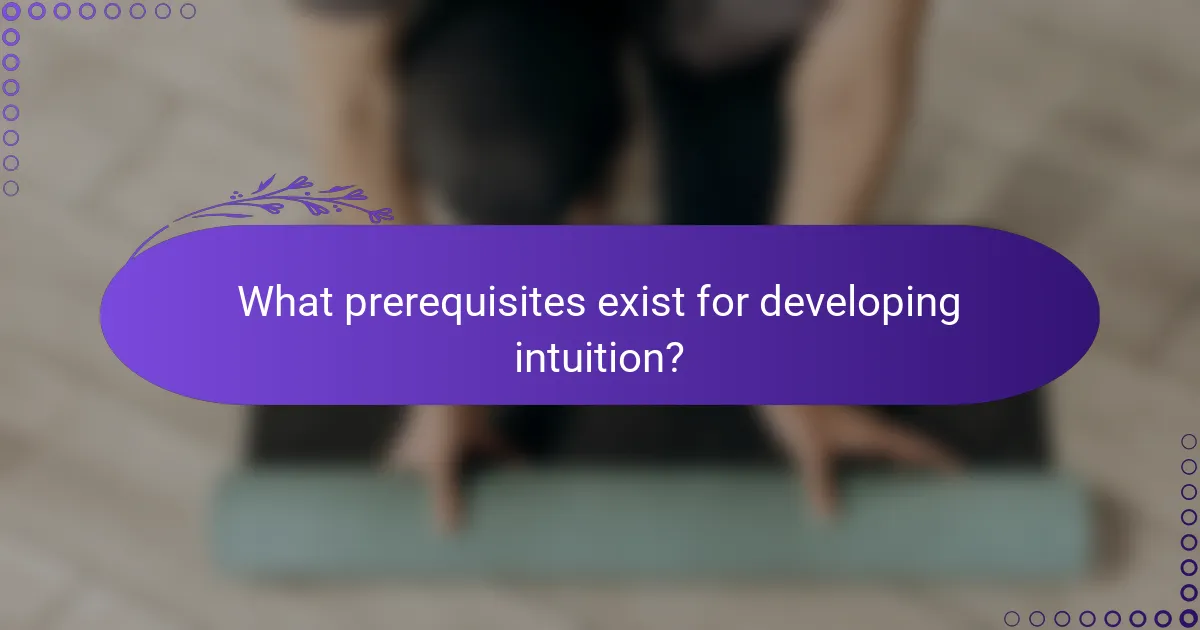
What prerequisites exist for developing intuition?
To develop intuition, individuals should cultivate self-awareness and create an environment conducive to introspection. This involves understanding personal emotional states and establishing routines that promote spiritual awareness.
Creating a quiet space
A quiet space is essential for tuning into your intuition. This can be a dedicated room, a corner of your home, or even a spot in nature where you feel at peace. Aim for a space that minimizes distractions, allowing for deep reflection.
Consider incorporating elements that enhance tranquility, such as soft lighting, calming scents, or comfortable seating. Regularly spending time in this space can help reinforce your connection to your inner self.
Establishing a regular practice
Consistency is key when developing intuition. Establish a regular practice that may include meditation, journaling, or mindfulness exercises. Aim for at least a few minutes each day to focus on your thoughts and feelings.
Over time, this routine can help you recognize intuitive signals more easily. You might also explore various techniques, such as guided meditations or visualization, to find what resonates best with you.
Understanding emotional blocks
Emotional blocks can hinder intuitive development. These may stem from past experiences, fears, or negative beliefs that cloud judgment. Identifying and addressing these blocks is crucial for enhancing your intuitive abilities.
Consider reflecting on your emotions through journaling or discussing them with a trusted friend or therapist. Techniques like cognitive behavioral therapy (CBT) can also help in reframing negative thoughts and clearing the path for intuition to flourish.

How can you measure your intuitive growth?
Measuring your intuitive growth involves recognizing changes in your ability to trust your instincts and make decisions based on gut feelings. This can be assessed through self-reflection, journaling, and tracking the outcomes of intuitive decisions over time.
Self-reflection and journaling
Engaging in self-reflection and maintaining a journal can significantly enhance your understanding of intuitive growth. Regularly writing about your experiences and feelings helps identify patterns in your intuitive responses and decision-making processes.
Consider setting aside time each week to reflect on moments when you relied on your intuition. Note the outcomes and your feelings about those decisions to gauge how your intuition has evolved.
Tracking outcomes
To effectively measure intuitive growth, track the outcomes of decisions made based on intuition versus those made through analytical reasoning. This comparison can provide insights into the reliability and accuracy of your intuitive insights over time.
Keep a simple log of decisions, categorizing them as intuitive or analytical, and note the results. Over a few months, you may notice trends that indicate an increase in your intuitive accuracy.
Seeking feedback
Obtaining feedback from trusted friends or mentors can provide an external perspective on your intuitive growth. They may offer insights into your decision-making style and how it has changed, which can be valuable for self-assessment.
Consider discussing specific instances where you relied on your intuition and ask for their thoughts on the outcomes. This dialogue can help you recognize areas of improvement and reinforce your intuitive abilities.
